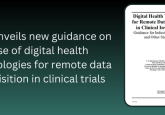FDA solidifies its position on decentralized clinical trials with final guidance

The final guidance provides recommendations for incorporating decentralized elements in clinical trials as part of the FDA’s effort to modernize trial design.
September 2024 has seen the publication of two significant guidances by the US Food and Drug Administration (FDA) as the agency take steps aimed at integrating real-world settings into clinical trials to advance diversity and representation, and enhance patient accessibility and convenience. Released alongside draft guidance on integrating randomized controlled trials (RCTs) into routine clinical practice, the new final guidance is titled “Conducting Clinical Trials With Decentralized Elements Guidance for Industry, Investigators, and Other Interested Parties.” This guidance is a key part of the FDA’s broader strategy to accelerate drug development and improve the efficiency of clinical trials and adds to the existing guidance on decentralized clinical trials (DCTs) provide by other regulatory bodies, including the European Medicines Agency (EMA).
A DCT is defined as, ‘a clinical trial that includes decentralized elements where trial-related activities occur at locations other than traditional clinical trial sites.’ These activities may include telehealth visits, in-home visits by trial personnel, or visits with local healthcare providers (HCPs) and allow participants to engage in trials from their homes or nearby locations. By enabling trial activities to be conducted remotely in locations convenient for participants, DCTs reduce the need for participants to travel to clinical sites as well as overcoming any challenges for participants who may not be able to access a trial site. This approach aims to improve participant accessibility and diversity, streamline trial processes, and reduce both costs and administrative burdens, ultimately improving the representativeness and generalizability of clinical trial data and ensuring that clinical trials are more adaptable to real-world healthcare settings.
The guidance focuses on several key areas to ensure compliance and efficiency in remote trial operations. It delineates the specific roles of sponsors, investigators and local HCPs, and emphasizes that regulatory standards for DCTs remain the same as those for traditional trials. This includes the requirements for monitoring data quality and integrity, informed consent, investigational product management, and safety monitoring. The document provides detailed recommendations on remote clinical trial visits, outlining how trial personnel, such as HCPs or home-based personnel, can conduct assessments and procedures remotely. The FDA advocates for early discussions between the agency and sponsors concerning the feasibility, design, implementation, or analysis of a DCT.
One of the major innovations discussed is the use of DHTs, which allow for the collection of clinical trial data through wearables and other electronic devices. These technologies enable continuous data collection and the transmission of information directly to trial personnel, streamlining the data management process. The guidance highlights the importance of ensuring that these technologies are accessible to all trial participants, regardless of socioeconomic background, and recommends that sponsors provide necessary equipment to participants when needed.
The guidance has been finalized following a public consultation process on the draft guidance in 2023.
Craig Lipset, who spoke to The Evidence Base about DCTs last year, will be taking part in a discussion on Linkedin on September 20, 2024, organized by Decentralized Trials & Research Alliance (DTRA).
Want regular updates on the latest real-world evidence news straight to your inbox? Become a member on The Evidence Base® today>>>






